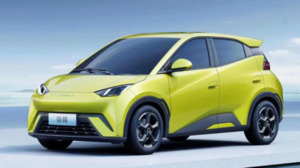Global car manufacturers are increasingly releasing affordable electric vehicles priced between 20 and 30 million won (approximately US$14,535 to US$21,802). This trend responds to the introduction of electric cars priced around 10 million won by Chinese automakers like BYD, fostering competition in the market. The strategy aims to overcome the “chasm,” a temporary drop in demand just before becoming mainstream, by offering vehicles even cheaper than many internal combustion engine cars.
According to the automotive industry on May 30, global automakers such as Stellantis and Volkswagen have recently announced plans to mass-produce electric vehicles priced around US$20,000. During the Bernstein Strategic Decisions Conference in the United States on May 29 (local time), Carlos Tavares, CEO of Stellantis, stated, “Just as we launched the €20,000 Citroen e-C3, we will soon launch a US$25,000 Jeep,” adding, “The standard for affordable electric vehicles is €20,000 in Europe and US$25,000 in the U.S.”
Volkswagen, the world’s second largest automaker after Toyota, also recently announced that it will begin selling the affordable entry-level electric vehicle ID.1, priced in the 20 million won range, starting in 2027. Volkswagen plans to launch the ID.2 next year, followed by the ID.2 SUV in 2026, and then the low-cost ID.1 in 2027. Among the ID series, which resembles the best-selling Golf model, the ID.4 was the best-selling European electric vehicle model in South Korea last month.
The ID.1, which will be the smallest model in the series, is expected to be priced around €17,000 (US$18,413). When launched in Europe, it is anticipated to compete with Renault’s Twingo, a budget electric car priced under €20,000 that was introduced at the end of last year.
The entry of the low-cost electric vehicle market by global car manufacturers has been prompted by Chinese companies. With the popularity of BYD’s budget electric car, the “Seagull,” priced at around 69,800 yuan (US$9,649), there is a growing need to respond to this trend.
In addition, BYD has recently reduced prices for over 100 different models compared to last December. The price of their best-selling Qin Plus has been lowered by 20 percent to 79,800 yuan. This aggressive pricing strategy is the reason why Tesla CEO Elon Musk made comment during an earnings call earlier this year that “without trade barriers, Chinese electric car companies would wipe out everyone.” Consequently, Tesla has also announced plans to release a low-cost electric vehicle priced around US$25,000.
Domestic companies have yet to announce plans for affordable electric vehicles. The most economical electric car from Hyundai Motor and Kia is the Ray EV, starting at 27.5 million won. Hyundai’s Kona and Kia’s Niro are priced in the 40 million won range, while KG Mobility’s Torres EVX is nearly 50 million won. Kia’s upcoming affordable electric vehicle, the EV3, is expected to be priced between US$35,000 and US$50,000, though the exact price has not yet been determined.

